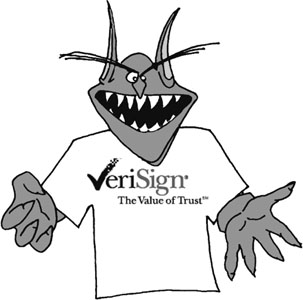![[Metroactive Features]](/features/gifs/feat468.gif)
[ Features Index | Silicon Valley | Metroactive Home | Archives ]

Empire of VeriSign By Annalee Newitz ONE OF THE PROBLEMS with living in a so-called information economy is that few people actually understand the commodities being traded in it. We know that "clicking" gets us to our favorite websites and that we can buy things from them or read articles on them or--woe is me--do our banking through them. But few of us have the time or inclination to pause and consider exactly how our computers get to www.salon.com when we type the letters into our browsers. Fewer still wonder what makes their financial transactions "secure" when they use Bank of America's extremely hackable website (nice SSL on that log-on form, kids). To learn something about the practically invisible network of buyers and sellers who create what you think of as the World Wide Web, let us consider the strange case of a company known as VeriSign. Perhaps you have not heard of it? Well, you should. When you go to a website with a .com, .org or .net at the end of it, you are using VeriSign's technology to find it. If you buy something from a website, the security of your financial transaction is likely to have been guaranteed by a VeriSign product. You may even have bought a domain name from the company. As the VeriSign website (www.verisign.com) trumpets proudly, it is the "leading provider of digital trust services." Now there's an interesting commodity: "trust." Obviously, we learn nothing about what the company is actually selling by reading its PR hype. So let's drill down deeper into its corporate overview. Here we learn that "VeriSign serves as a gateway to establishing an online identity and Web presence, operating the definitive database of over 27.3 million Web addresses in .com, .net and .org on a powerful platform that is the world's de facto standard in Domain Name System (DNS) registry services." Rough translation: We control the horizontal; we control the vertical. Seriously, what this means will probably be startling to people who imagine--not entirely incorrectly--that the web is made out of a diverse array of machines linked together in a kind of ragtag democratic harmony. In reality, one aspect of the web is centralized through VeriSign's databases. Every time your computer looks for a domain that ends in .net, .org or .com, it has to talk to VeriSign's Domain Name Server (DNS) registry, a vast and ugly database containing the addresses of every single .com, .org. or .net URL. As critics have pointed out, VeriSign's monopoly on this information has a lot of drawbacks: the company has often been sloppy about maintaining accurate information about the ownership of particular domain names, sometimes handing off ownership quite literally at the drop of a fax. And it gets worse. Not only does VeriSign regulate your ability to access URLs, it controls your ability to own them, too. Ah, so that's why the company says it's "a gateway to establishing an online identity and web presence." Basically, if you want to own or operate a piece of cyber-real estate, at some point you're likely to deal with the goons at VeriSign. Imagine if such a scenario could be translated into real-world terms. Any time you wanted to travel somewhere, you'd have to get directions from VeriSign's registry. Without those directions, you would effectively lose your mobility rights. If you wanted to buy or rent a place for your stuff, VeriSign would sell it to you. Your movements and living arrangements would be controlled by one company. Add to this the twist that VeriSign is also in the security business, selling authentication certificates and secure transactions tech to companies that deal in private information like credit card numbers and so forth. So, in real-world terms, if you wanted to take a trip somewhere, you'd get permission from VeriSign, then they'd sell you "safe passage" there--and not only that, they'd probably own the place you were traveling to. Yes, it's creepy. A kind of dark comical flare tinges the story of VeriSign when you consider an impending class-action suit against it for deceptive advertising. When the company's stock was cut in half due to a severe drop-off in domain-name purchases, VeriSign's marketing geniuses were already swinging into action. Said geniuses mined the databases of other companies that sell URLs, then sent letters to customers of their competitors. These alarmist letters stated that the customers' domain-name registration was about to expire--and they'd better renew now or lose it! Where should the scared and befuddled customer go to renew? Why, VeriSign of course. The name you associate with "digital trust." Right?
Annalee Newitz (verisignmustdie@techsploitation.com) is a surly media nerd whose domain name is being regulated by VeriSign right now.
Send a letter to the editor about this story via email . [ Silicon Valley | Metroactive Home | Archives ]
|
From the May 30-June 5, 2002 issue of Metro, Silicon Valley's Weekly Newspaper.
Copyright © Metro Publishing Inc. Metroactive is affiliated with the Boulevards Network.
For more information about the San Jose/Silicon Valley area, visit sanjose.com.